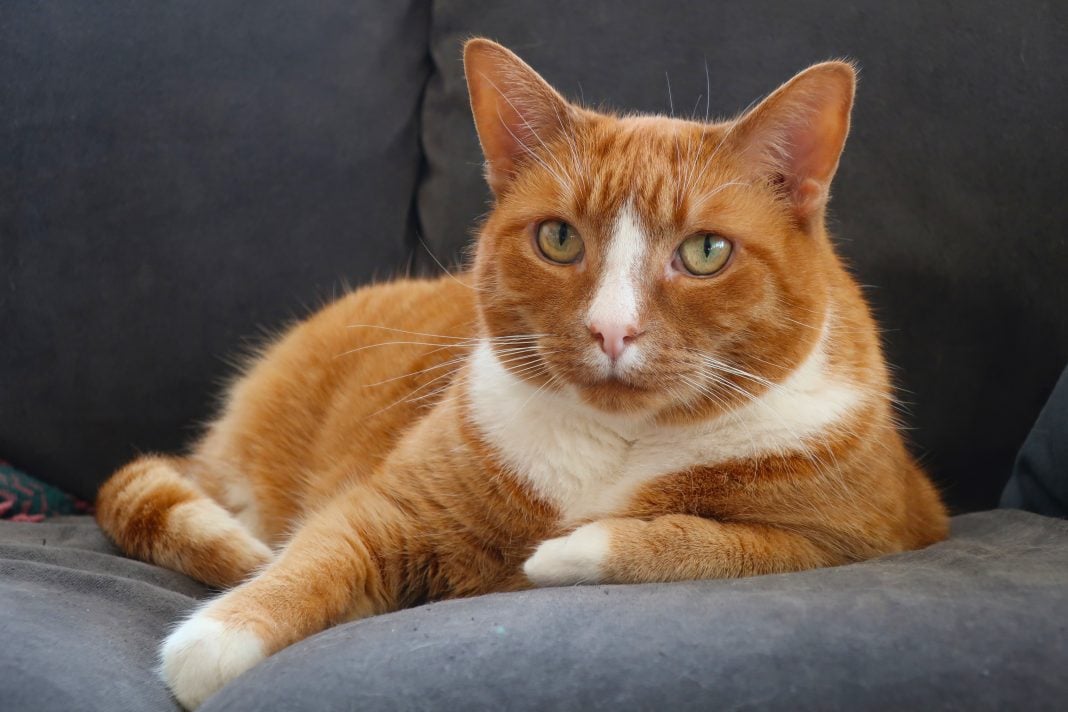Looking for the Best Kitten Milk Replacers? Caring for young kittens requires providing them with the most nutritious and safe alternatives to mother’s milk. Kitten milk replacers are specially formulated to meet the dietary needs of growing kittens, ensuring they develop into healthy, strong adults. In this article, we will explore various options available on the market, focusing on their nutritional value, ease of use, and customer reviews, helping you make an informed decision when selecting the best product for feeding your furry little friend.
1. Nutri-Vet Milk Replacement For Kittens
The Nutri-Vet Milk Replacement For Kittens is a nutritional formula designed to provide newborn kittens with a complete meal replacement. It contains essential nutrients such as protein, fat, carbohydrates, vitamins, minerals, and amino acids that are crucial for the growth and development of young kittens. The formula is easily accepted by newborn kittens and promotes excellent growth rates and weight gain. Additionally, it includes probiotics to support a healthy gut and digestion. This product is made in the USA with high-quality ingredients and is formulated by veterinarians to ensure the highest standards of quality.
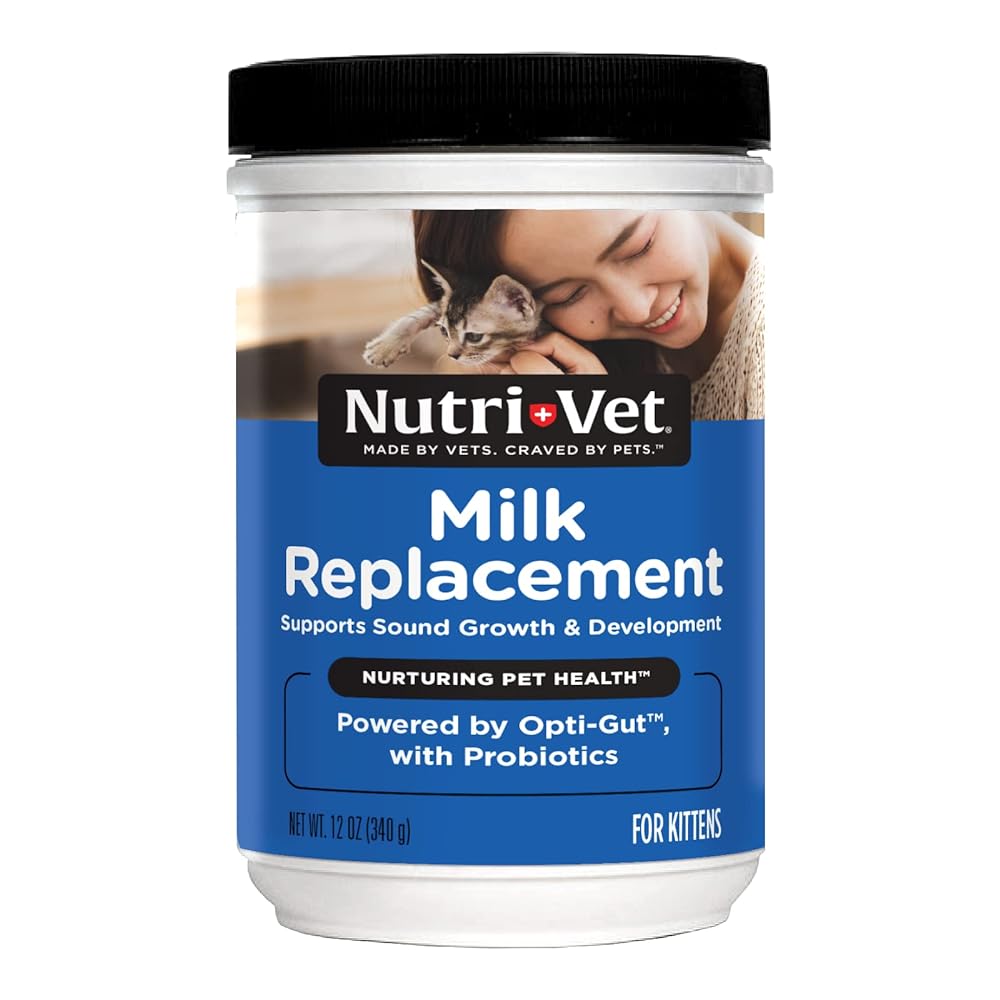
2. PetAg KMR Kitten Milk Replacer Powder
The PetAg KMR Kitten Milk Replacer Powder is a product designed specifically for newborn kittens up to six weeks old. It contains prebiotics and probiotics to support the kitten’s digestive system. The product is a powdered formula that breaks down nutrients in food to promote optimal absorption and a healthy immune system. Additionally, the package includes Prozyme Powder, an all-natural health supplement with digestive enzymes for both dogs and cats. PetAg is known for delivering high-quality products for pet owners and professionals.
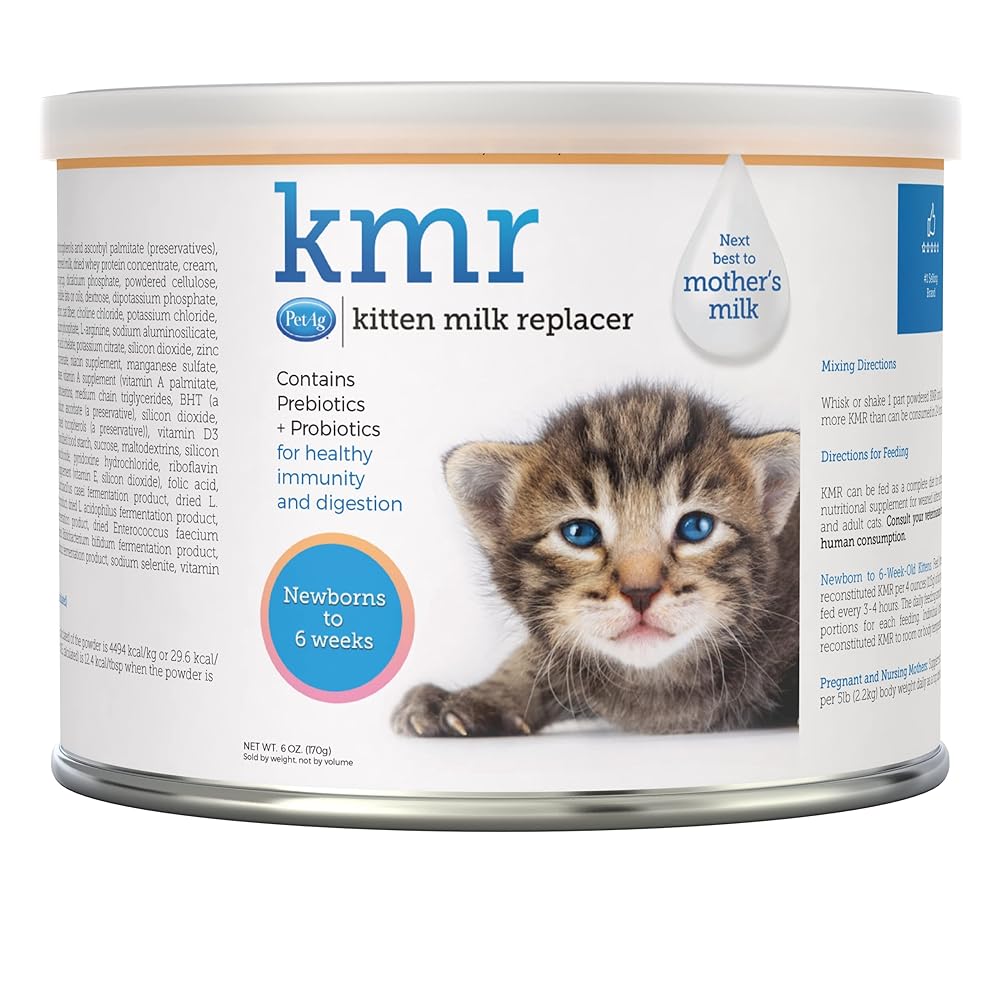
3. Hartz Powdered Kitten Milk Replacer Formula
The Hartz Powdered Kitten Milk Replacer Formula is a product that is designed to mimic a mother cat’s milk, providing essential nutrients and vitamins for kittens during their first six weeks of life. This quick-mix powder easily blends with room temperature water for convenient on-demand feeding and can be used with the Hartz Nursing Bottle. The formula includes calcium for strong bones, taurine for heart and eye development, lysine for respiratory health, and linoleic acid for healthy skin and coat. Additionally, it can also be used as a food supplement for pregnant and nursing mothers, as well as convalescing cats.
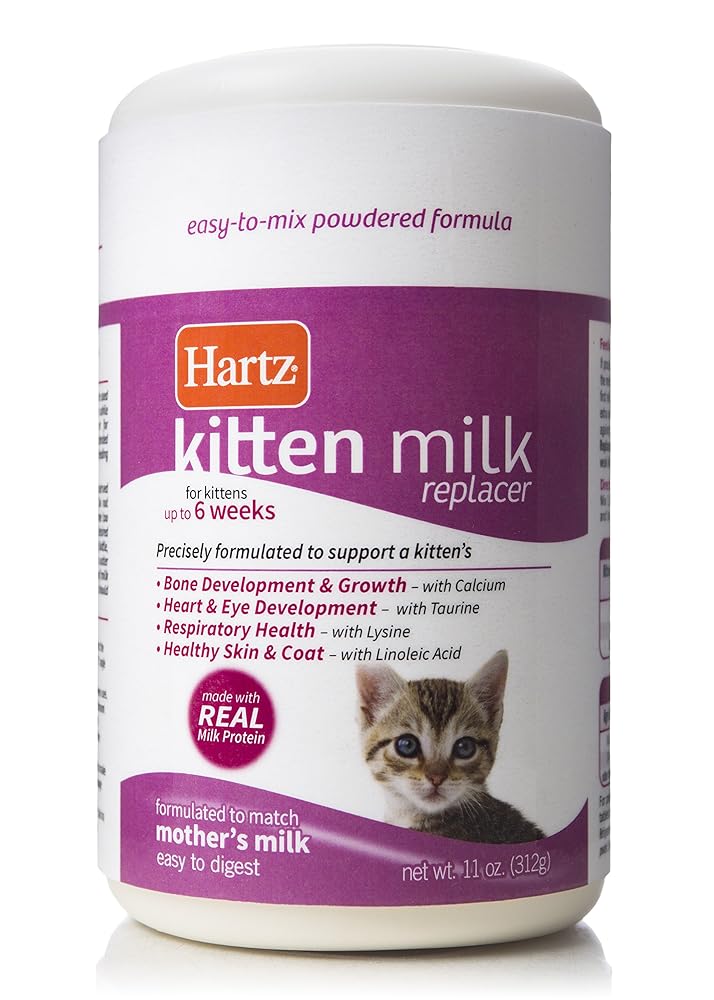
4. PetAg Petlac Milk Powder for Kittens
The PetAg Petlac Milk Powder for Kittens is a recommended food source for orphaned or rejected kittens. It contains vitamins, minerals, and amino acids that provide the nutrition required for proper growth and development. This milk replacement powder is easy to administer and contains easily digestible nutrients. PetAg is known for delivering top-quality products for both pet owners and animal professionals, making it an excellent care solution for newborn kittens.
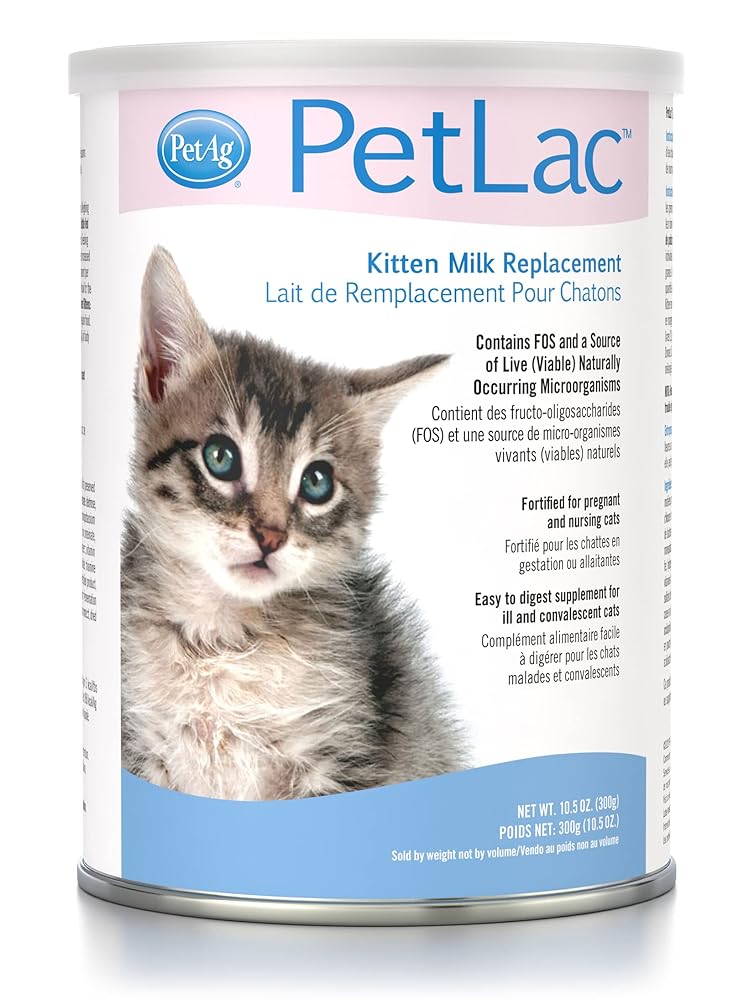
5. Breeder’s Edge Foster Care Feline
The Breeder’s Edge Foster Care Feline Powdered Milk Replacer is a product designed to provide complete and balanced nutrition for kittens and cats during the first 35 days of their life. It can also be used as a nutritional supplement for pregnant, lactating, or convalescing adult dogs. The formula contains ingredients such as BIO-MOS to support a healthy GI tract and IgY to boost the immune system. Additionally, it offers benefits for conditioning the skin and hair coat and can be used as a milk treat or flavor enhancer.
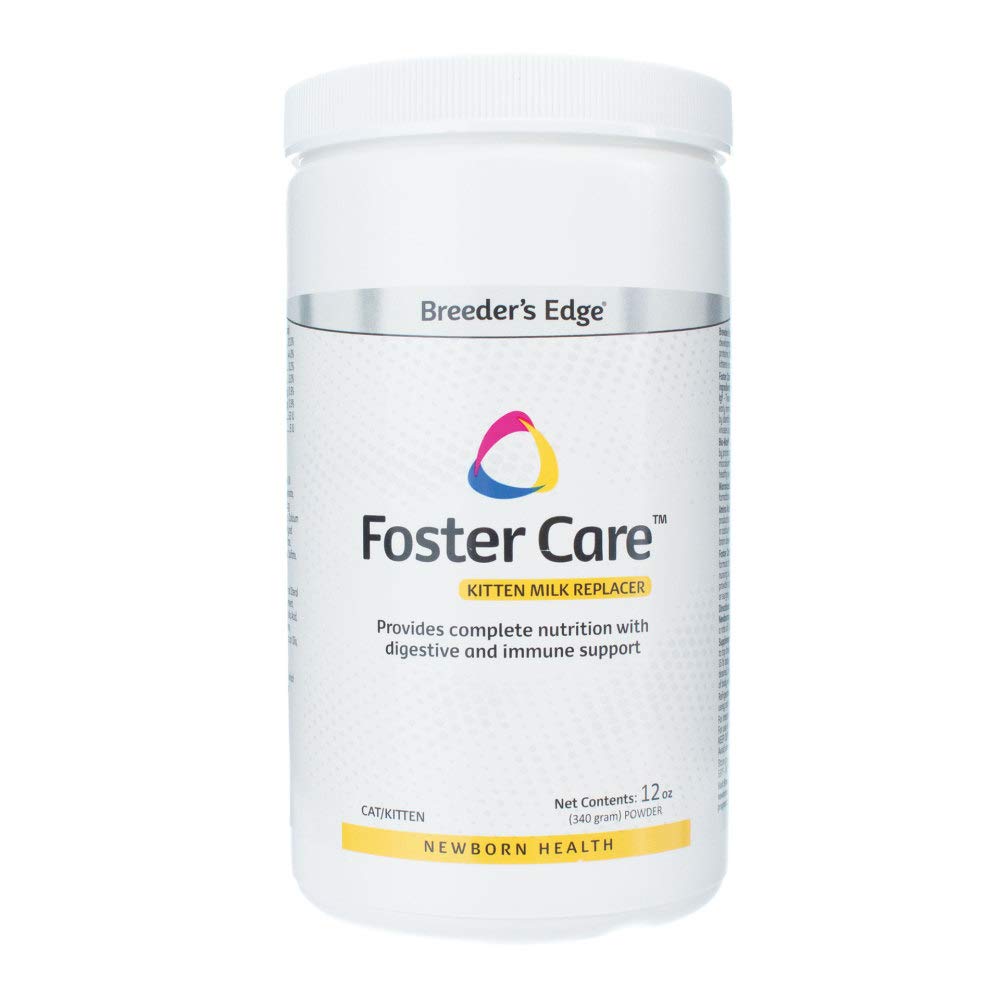
6. TAILSPRING Milk Replacer for Kittens, Liquid
The TAILSPRING Milk Replacer for Kittens is a liquid, ready-to-feed milk replacer that is made with whole goat milk. It contains a 12 fl oz can and is made with 100% human-grade ingredients. The product boasts a clean ingredient list without any preservatives, artificial colors, or flavors. The primary ingredient, goat milk, is gentle on a kitten’s stomach. Additionally, it can be used as a nutritious meal topper or treat for adult cats.
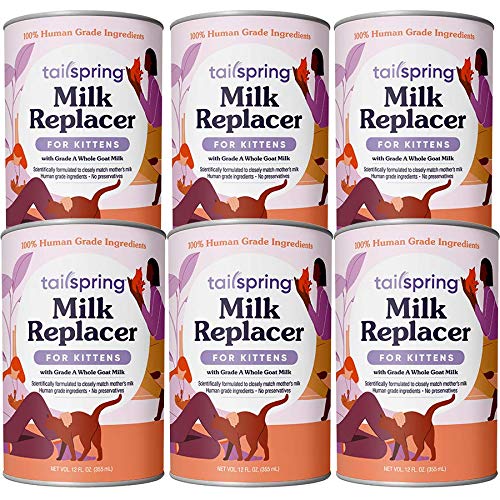
What Should I Look For When Choosing a Quality Kitten Milk Replacer?
When choosing a quality kitten milk replacer (KMR), it is imperative to consider several factors that align with the nutritional needs of a growing kitten:
1. Nutritional Content:
- Look for a KMR that closely mimics the nutritional profile of a mother cat’s milk. It should be rich in protein and fat, and contain essential nutrients, vitamins, and minerals to support healthy growth and development.
2. Digestibility:
- The KMR should be easily digestible for kittens. Ingredients should be processed to enhance digestibility, ensuring that the kittens can efficiently absorb and utilize the nutrients.
3. No Harmful Additives:
- A quality KMR should be free from harmful additives, preservatives, and artificial colors or flavors. It should also be devoid of substances that kittens might be sensitive or allergic to.
4. Easy to Mix:
- The replacer should easily mix with water without forming clumps. This is important for creating a smooth, consistent formula that can be easily consumed by kittens.
5. Veterinarian Recommended:
- Products that are endorsed or recommended by veterinarians often have a reliable level of quality and nutritional adequacy.
6. Brand Reputation:
- Consider purchasing from reputable brands known for producing high-quality, safe, and effective pet nutrition products.
7. Expiration Date:
- Check the expiration date on the packaging to ensure the product is fresh and safe for kitten consumption.
8. Customer Reviews:
- Go through customer reviews and testimonials. Feedback from other pet owners can provide valuable insights into the effectiveness and acceptability of the product.
9. Price:
- While price is a factor, it shouldn’t be the only consideration. Investing in a high-quality KMR is vital for the health of the kittens, so it’s worth paying a bit more for a premium product.
Frequently Asked Questions About Kitten Milk Replacers
- What is a kitten milk replacer (KMR)?
- A kitten milk replacer is a specially formulated product designed to provide essential nutrients to kittens who are orphaned, rejected by their mothers, or those whose mothers can’t produce enough milk. It mimics the composition of a mother cat’s milk to support healthy growth and development.
- When should kittens start and stop using KMR?
- KMR is usually given to newborn kittens up until they are ready to transition to solid food, around 4 to 6 weeks of age. However, this can vary, and it’s crucial to monitor each kitten’s individual development and dietary needs.
- Can I give cow’s milk to my kitten instead of a KMR?
- Cow’s milk is not recommended for kittens as it lacks the necessary nutrients and can cause digestive issues. KMRs are formulated to meet the specific nutritional requirements of kittens.
- How often should I feed my kitten with a KMR?
- Newborn kittens typically require feeding every 2-4 hours. The frequency decreases as they grow older. Follow the instructions on the KMR packaging or consult with a veterinarian for precise feeding schedules.
- How do I prepare and store KMR?
- Mix the KMR with water as per the instructions on the packaging. Prepare only the amount needed for immediate use and store any unused portion in the refrigerator for up to 24 hours. Discard any unused mixed formula after this period.
- Can I use a KMR for sick or malnourished adult cats?
- While KMR is formulated for kittens, it can temporarily be used for adult cats that are convalescent, malnourished, or have certain health issues, as it provides essential nutrients. Always consult a vet before making dietary changes.
- Is it necessary to warm up the KMR before feeding?
- Kittens often prefer KMR at body temperature, which is more soothing and easier to digest. You can warm the formula by placing the feeding bottle in a bowl of warm water. Always test the temperature before feeding.
- How can I ensure my kitten is getting the right amount of KMR?
- The KMR package typically provides feeding guidelines. However, individual kittens’ needs can vary. Monitoring your kitten’s weight and consulting with a veterinarian can help adjust feeding amounts appropriately.
- What should I do if my kitten doesn’t accept KMR?
- Introduce the KMR gradually and ensure it’s at the correct temperature. If the kitten still refuses, consult a veterinarian immediately as refusal to eat can lead to critical health issues in young kittens.
- Can I continue to use KMR as a supplement once my kitten starts eating solid foods?
- While some kittens benefit from supplemental feeding with KMR during the transition to solid foods, it’s essential to gradually decrease reliance on the replacer. Consult with a vet to develop a balanced dietary plan for your kitten.
Final Summary: The Best Kitten Milk Replacers
In this article, we reviewed the Best Kitten Milk Replacers. Selecting the right product is crucial for your kitten’s healthy growth and development. The replacers listed not only offer essential nutrients but also cater to the specific dietary needs of young kittens. When choosing, consider the product’s ingredients, brand reputation, and customer reviews. Ensuring your kitten gets the best start in life with proper nutrition is paramount, and these top-rated kitten milk replacers are designed to do just that. Happy feeding!

